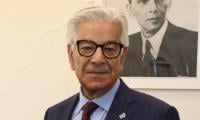LAHORE: Following the teachings of Holy Quran is a prerequisite to achieve the objective of establishing an ideal, tolerant and peaceful society and countering the menaces of terrorism, extremism and sectarianism; this was the crux of two days of discussions held here at the Lahore University of Management Sciences (LUMS) and the University of Lahore (UoL).
The discussions titled ‘Paigham-e-Pakistan Narrative and the Establishment of an Ideal Society’ were organisedas part of a two-day ‘International Quran Conference’, attended by international scholars including Dr Abdullah al-Ahsan, Professor of Comparative Civilization, Department of Political Science and International Relations Istanbul Sehir University, Turkey; Dr Khairi Mahyuddin, Faculty of Leadership and Management, Universiti Sains Islam Malaysia; Dr Lloyd Ridgeon, Reader in Islamic Studies, University of Glasgow; Dr Martin Mahmud Kellner, Institute for Islamic Theology, University Osnabruck Germany; and Shaykh Ahmad Dabbagh, Principal of UK Academy of Islamic Sciences, Director of Wiselife Academy Manchester, UK.
Addressing the participants, the speakers said the Holy Quran as well as Holy Prophet (Peace Be Upon Him) have advocated the creation of a socially inclusive society that embodies a sense of inclusion, establishes a tradition of mutual respect, encourages diversity of perspectives and commends broadmindedness without any racial and religious prejudice. “Extremism is not the message of Islam. Islam is the religion of peace and humanity. Collective efforts for dissemination of the true message of Islam are imperative and the Paigham-e-Pakistan narrative is a timely step to pursue this goal. The message should be spread across the globe. We must portray a soft and positive image of Islam and highlight Islam as a religion of peace, brotherhood, tolerance and accommodation,” they said.
The speakers especially highlighted the role of ulema, faculty members, civil society and youth to achieve the goal of successfully building a counter-narrative to violence, extremism and terrorism. “It is the fundamental responsibility of Islamic scholars to protect the religion from corruption, defend it from aggression and protect its sanctity and purity,” they said. “However, sustaining the positive image of Islam should not be seen as responsibility of the clerics alone but a collective responsibility of all segments of a society,” they said, while calling for devising a comprehensive strategy against Islamophobia through close linkages between Ulema and the educational institutions.
According to the CTD spokesman, the two were attempting to enter Punjab from Khyber Pakhtunkhwa
Foreign Office's silence on the US threat to impose sanctions on Pakistan for economic agreements with Iran
President Zardari express views while talking to the visiting Chairman of China International Development Cooperation...
Kundi emphasised that recent electoral outcomes indicated a public preference for parliamentary cooperation over...







